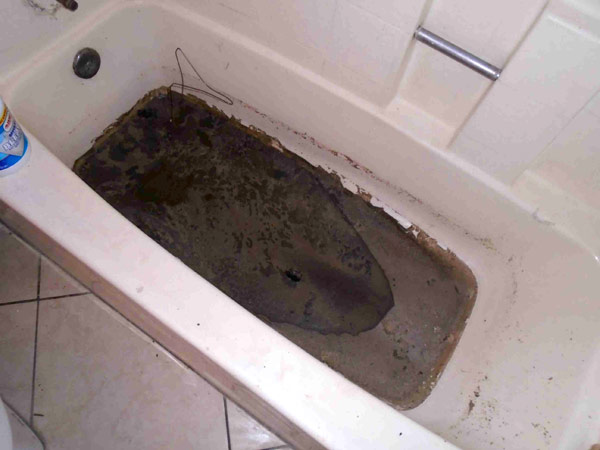Highly-Rated Reasons for Discharge Coming Up in the Bathtub
Highly-Rated Reasons for Discharge Coming Up in the Bathtub
Blog Article
Everybody is bound to have his or her own rationale in relation to Water Coming up Bathtub Drain.

Sewage backup in the tub can be an upsetting and unhygienic issue for any kind of home owner. Not only is it bothersome, however it also positions significant health and wellness dangers and shows underlying issues with the plumbing system. Understanding why sewer is turning up through the bath tub is essential for taking proper action to deal with the issue effectively.
Introduction to the Problem
Usual Factors for Sewage Backup
Blockages in the Sewage System Line
One of the most typical causes of sewage back-up is a clog in the sewer line. This can take place because of the buildup of particles, grease, or foreign objects in the pipes, protecting against proper circulation and creating sewer to support right into your bath tub.
Tree Origin Breach
Tree roots looking for wetness and nutrients can infiltrate sewer lines through small splits or joints. Over time, these roots can expand and broaden, triggering considerable damages to the pipes and resulting in sewer back-up problems.
Recognizing the Trouble
When sewage starts backing up into the bathtub, it's a clear indicator of a trouble with the drainage system. The wastewater that must be moving away from your home is rather finding its back right into your living space, which can lead to considerable damage and health hazards.
Potential Causes
Numerous factors can add to sewage backup in the bathtub. From clogs in the drain line to issues with the plumbing facilities, identifying the source is vital for locating an option.
Aging Infrastructure
Older homes might have obsoleted plumbing systems that are much more at risk to corrosion, splits, and degeneration. As pipelines age, they end up being more vulnerable to leakages and clogs, increasing the probability of sewer back-up cases.
Heavy Rainfall or Flooding
Throughout periods of heavy rainfall or flooding, the drain system may end up being overloaded with excess water, triggering backups and overflows. This can cause sewage supporting into bath tubs and various other fixtures inside the home.
Indications of Sewage Back-up
Foul Odors
Unpleasant smells emanating from drains or fixtures, especially in the shower room, may indicate sewer back-up concerns. These smells are often strong and consistent, signifying a trouble that calls for prompt focus.
Slow Draining Fixtures
Bath tubs, sinks, and bathrooms that drain gradually or not whatsoever could be experiencing sewage back-up. If multiple components are impacted concurrently, it's likely that the problem stems from a common point, such as the primary sewage system line.
Gurgling Sounds
Weird gurgling or gurgling noises coming from drains when water is running elsewhere in your house are a sign of air caught in the plumbing system. This air build-up can arise from sewer backup and ought to be investigated promptly.
Health And Wellness Risks Connected With Sewage Back-up
Contamination of Water Supply
Sewage backup can pollute the water in your home, posturing a significant health and wellness risk to you and your family members. Direct exposure to polluted water can cause gastrointestinal issues, skin infections, and various other health problems.
Mold and mildew Development
Wetness from sewer back-up can develop ideal conditions for mold and mildew growth in your home. Mold and mildew spores can exacerbate respiratory system troubles and cause allergies in sensitive individuals, making punctual cleanup crucial.
Spread of Disease
Sewage consists of harmful germs, infections, and parasites that can create a variety of diseases, including liver disease, cholera, and gastroenteritis. Coming into contact with sewer or polluted surfaces places you at risk of infection.
Cleaning Up After Sewage Back-up
Disinfection Procedures
Extensively disinfect and sterilize influenced locations after sewer back-up to get rid of dangerous bacteria and avoid mold growth. Use ideal cleansing items and protective gear to make sure secure and effective cleaning.
Restoration of Affected Areas
Repair any kind of damage to floor covering, walls, or components triggered by sewage backup. Depending on the degree of the damage, you might require to replace carpets, drywall, or various other products to restore your home to its pre-loss condition.
Immediate Actions to Take
Switching Off Water Supply
In the event of sewage backup, it's vital to switch off the water to avoid further contamination and damages. Find the primary water shutoff valve in your home and closed it off till the concern can be resolved.
Getting In Touch With an Expert Plumber
Taking care of sewer back-up is not a DIY job. Contact a qualified plumber with experience in dealing with sewage-related issues to examine the scenario and execute necessary repairs or cleanups.
Avoiding Contact with Contaminated Water
Up until the sewer backup is solved, avoid contact with polluted water to prevent the spread of bacteria and microorganisms. Wear safety equipment if you have to be in the affected location and clean your hands completely afterward.
Safety nets
Regular Upkeep of Drain Lines
Arrange regular examinations and upkeep of your sewer lines to identify and attend to possible problems prior to they escalate into significant issues. This can consist of cleaning out particles, evaluating for tree root intrusion, and repairing any kind of damaged pipelines.
Setting Up Bayou Valves
Take into consideration setting up bayou valves in your plumbing system to avoid sewage from receding into your home during periods of heavy rainfall or flooding. These shutoffs instantly close when water draws back up, safeguarding your residential property from contamination.
Proper Disposal of Household Waste
Prevent purging anything apart from bathroom tissue and human waste down the toilet to prevent clogs and clogs in the sewer line. Dispose of oil, oil, and other house chemicals appropriately to minimize the risk of plumbing problems.
Why is There Sewage Coming Up Through the Bathtub
Sewage in your bathtub is a major problem that can make you want to abandon the bathroom for good. You don’t have to. However, it is important to identify the source of the issue and take the necessary steps to resolve it in order to avoid any health risks and property damage. In this article, we will discuss what could be causing sewage to back up through your bathtub so you can take action quickly and effectively.
The Main Reason For Sewage Backup in The Bathtub
All the sinks and toilets in your home connect to different pipes that lead to the main sewer line. The sewer line then connects to the municipal sewer system. This connection works seamlessly on a daily basis, but there can sometimes be a problem with the main sewer line.
The most common cause of sewage backup is a clogged or blocked main sewer line. The main sewer line can be clogged due to the accumulation of debris, tree roots or grease buildup, or other materials. Another possible cause is a collapsed pipe. When this happens, your toilets and sinks won’t be able to drain properly. This is when sewage starts backing up through the bathtub. If the problem has been occurring for some time now, it might be time to consult with a plumber as there may be more severe damage that needs fixing.
How Can You Tell if it’s Coming From Your Sewer Line?
If you’re experiencing a sewage backup in your bathtub, then you can use a few simple methods to determine if it is coming from the main sewer line. First, try to unclog the tub drain with a plunger or an auger and see if that helps. If not, then inspect all of the drains in your house and check if there is any blockage in them. If some of the other drains are not working fine, then it’s likely the problem is with your main sewer line.
Common Signs of a Clogged Main Sewer Line
If you suspect that your main sewer line is blocked, then there are a few common signs to look out for. Frequent clogs in your home are a sure sign of a clogged sewer line. You can also check for slow drainage from all the plumbing fixtures.
Slow Drains
If you notice that it takes longer for your sinks and toilets to drain, then this could be a sign of a clogged main sewer line.
Frequent Clogs
Another common sign is that your drains or toilets become clogged almost all of the time. If this happens, then it could be a sign that the main sewer line is blocked.
Water Backup
Do you notice water or sewage coming back up from any of the drains in your home? If your answer is yes, you may have a clogged main sewer line.
Sinkholes
If you’ve noticed sinkholes in your yard or overflowing sewage from the ground, you may be facing a blocked sewer line issue.
Your Shower or Sink Makes Gurgling Noises
Have you noticed gurgling noises coming from your sink or shower lately? These are typically signs of a blocked sewer line and should be checked out immediately.
How to Prevent a Main Sewer Line Clog
Once you’ve identified that your main sewer line is clogged, it’s important to take steps to prevent it from happening again. The best way to do this is to avoid putting any solid material that can clog the drain, such as grease and other debris. You should also be mindful of what you flush down your toilet. In addition, you should schedule regular maintenance for your main sewer line. This will help keep it clear and free from clogs or backups.
What Should You do if You Notice Sewage Backing up Through The Bathtub?
If you’ve noticed sewage backing up through the bathtub, then it is important to call a professional plumber immediately. A plumber can inspect the situation and determine what the cause is, such as a blocked main sewer line. They will also be able to advise you on how best to fix the issue. In some cases, a simple drain cleaning may be all that is needed.
However, if the blockage is severe, then your plumber may need to use more advanced methods to clear the blockage.
No matter what, it is important to always call a professional plumber if you experience any kind of sewage backup. They will be able to assess the situation and provide you with a solution that is best for your home.
https://baylorinc.com/blog/why-is-there-sewage-coming-up-through-the-bathtub/

I stumbled upon that write up on Why sewage is coming up through your bathtub when doing a search on the internet. Are you aware of somebody else who is excited about the subject? Please feel free to share it. We thank you for your readership.
Call Today
Report this page